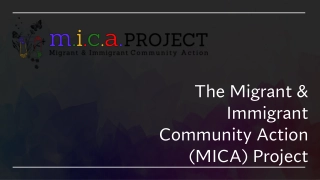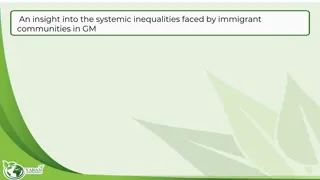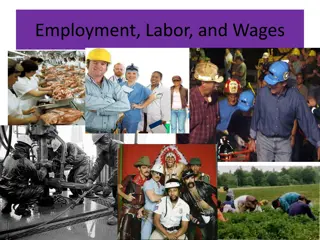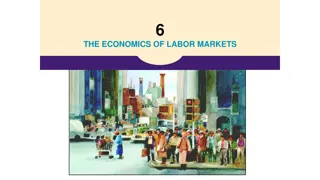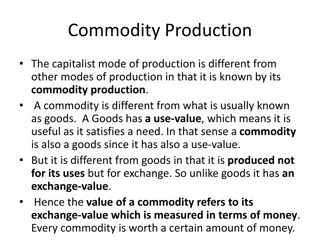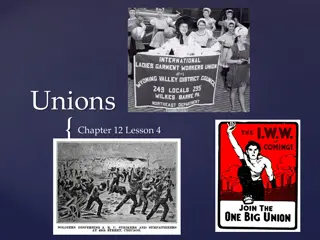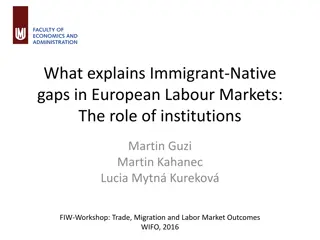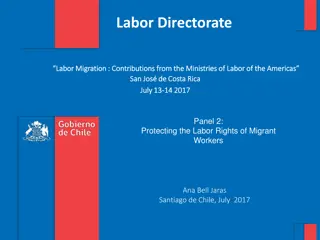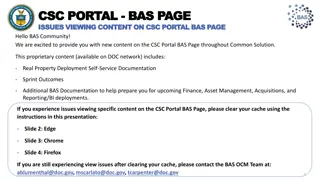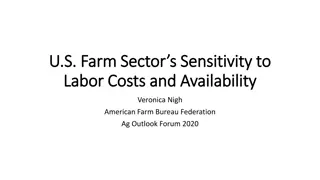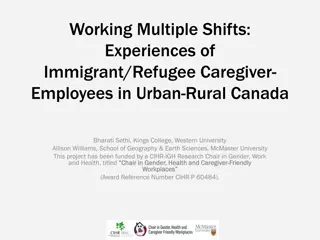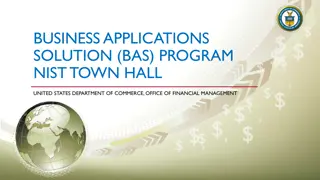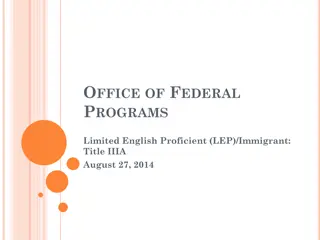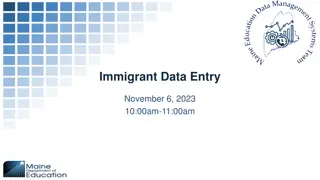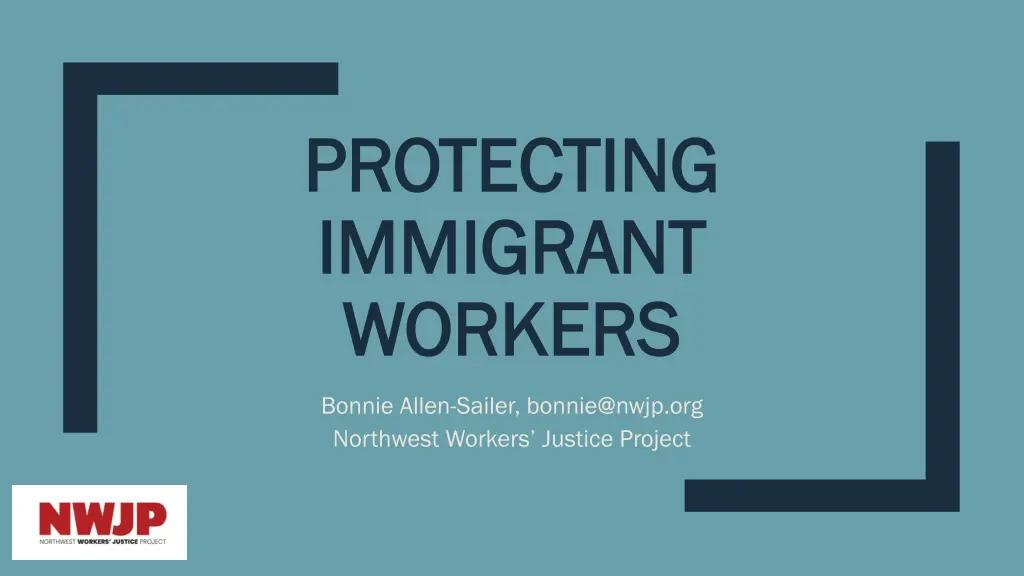
Empowering Immigrant Workers: Rights, Enforcement, and Support
Discover how to protect immigrant workers' rights in the workplace, including dealing with No Match Letters, I-9 audits, and other critical information. Get insights on advocating for fair treatment and ensuring workers have the support they need.
Download Presentation

Please find below an Image/Link to download the presentation.
The content on the website is provided AS IS for your information and personal use only. It may not be sold, licensed, or shared on other websites without obtaining consent from the author. If you encounter any issues during the download, it is possible that the publisher has removed the file from their server.
You are allowed to download the files provided on this website for personal or commercial use, subject to the condition that they are used lawfully. All files are the property of their respective owners.
The content on the website is provided AS IS for your information and personal use only. It may not be sold, licensed, or shared on other websites without obtaining consent from the author.
E N D
Presentation Transcript
PROTECTING PROTECTING IMMIGRANT IMMIGRANT WORKERS WORKERS Bonnie Allen-Sailer, bonnie@nwjp.org Northwest Workers Justice Project
What can we do? What can we do? General overview of immigrant workers rights in the workplace No match letters I-9 audits Workplace enforcement Know what is coming Other ways to protect immigrant workers Talk to Workers Relief for immigrant victims of crime in the workplace Talk to Employers
Immigrant Workers Rights Wage and Hour All rights and remedies Discrimination All rights and arguably all remedies Workers Compensation Most rights and remedies NLRB All rights. Significant limitation in remedy: no back pay.
No Match Letters Letters sent out by government agencies that refer to a problem with workers name and social security numbers Example: social security administration sends letters notifying employers when they pay social security taxes that the name and SSN number supplied do not match SSA records. Letters explicitly state that they do not provide constructive knowledge that an employee is not authorized to work This means an employer does not have to immediately terminate worker Employer must give employee a reasonable time to resolve
No Match Letters: talk to workers Workers don t have to (and shouldn t) try to explain their situation to employers. Immigration status information is private. Workers should ask their employer for time to resolve. 120 days is reasonable Workers should talk to a lawyer or advocate if they think they are being targeted unfairly.
No Match Letters: talk to employers Give notice to union so union can support and advise affected workers Give workers reasonable time to resolve (120 days) No interrogation Don t take adverse action against workers
I-9 Audits ICE can require employer to produce copies of I-9 compliance documents for review I-9 is the form employers are supposed to have all new employees fill out to verify identity and authorization to work Audit is to check if employer followed the rules What happens? Employer may receive fines and/or be required to terminate employees who can t provide valid work authorization documents ICE can come to workplace to detain workers or use addresses on documents to go to residences.
Employer has to give notice to employees within 3 business days of any notice by a federal agency requiring employer to provide access to I-9 documents Notice Posting Individual notifications ORS 652.752 Employer notice should include Copy of the notice of inspection Date of inspection Scope of inspection if known Employer s obligation to respond Hotline number: 1-888-622-1510 Oregon Law requires employers give notice of I-9 audits
I-9 Audits: talk to workers Workers don t have to (and shouldn t) try to explain their situation to employers. Immigration status information is private. Workers should request basis of discrepancy in writing and ask for as much time as possible to resolve. If workers have valid documents that could help, they should consider presenting them to employer. Workers should be aware updated documents may be sent to ICE and ICE may ask to interview them about those documents. Determine if there is any evidence this was a self-audit or triggered by an employer calling ICE tip line themselves for retaliatory reasons?
I-9 Audits: talk to employers No self-audits or reverifications Keep I-9 forms in separate folder from rest of personnel file Allow reasonable time to correct discrepancies (ICE may order specific deadline) or leave of absence if more time is needed Timeline, requirements to respond, etc, should be the same for all workers, regardless of race or national origin. Agree to pay unpaid wages promptly Agree to PTO pay out, severance, or other compensation if terminated
WORKSITE ENFORCEMENT ACTIONS
Worksite Enforcement Actions Can be employer-wide or focused on a specific person ICE may start with specific person but try to question or detain others, including family members, workers not present that day, etc. Historically, there were some protections for workers involved in labor/civil rights enforcement. Some or all may be cancelled by new administration DALE Deconfliction
Prohibits law enforcement from spending any resources for the purpose of immigration enforcement Prohibits public bodies from inquiring or disclosing information about an individual s immigration or citizenship status or country of birth Other specific provisions limit collaboration with federal agencies enforcing immigration laws There are some loopholes related to criminal law Hotlines: 1-844-924-7829 (English + Other) 1-844-626-7276 (Spanish) Oregon s Sanctuary Promise Act Oregon law prohibits law enforcement and public bodies from cooperating with immigration enforcement efforts
Public vs. Private Areas Public Private Dining area, lobby, etc Staff only areas ICE does not need permission to enter ICE needs consent or a judicial warrant Look carefully, must be signed by a judge, have court name on top ICE would need additional authority/reason to stop, question, or arrest someone
Raids: talk to workers Encourage solidarity Train workers in advance to stay calm and assert their rights Do not give permission to enter without judicial warrant Do not give information about themselves or their coworkers ACLU red cards Connect workers with immigrant rights orgs for KYR, family preparedness, gathering important documents, etc Have a plan re: documenting what happens, notifying families and advocates Hotline numbers: ECO: 1-888-274-7292 (immigration legal services) PIRC: 1-888-622-1510 (community advocates and mobilization)
Raids: talk to employers Label private areas of workplace as staff only or private or no public access Refuse to admit federal agents to private areas without judicial warrant Refuse to disclose information about employees without judicial warrant Train all staff re: above practices
OTHER WAYS TO PROTECT IMMIGRANT WORKERS
Talk to employers No inquiries into immigration status except as required by law No voluntary participation in E-Verify Allow corrections/updates in name and SSN information without retaliation, termination, or other adverse action such as loss of seniority or benefits Allow for leave of absence, reinstatement without loss of benefits for workers whose work authorization documents expire Language Access provisions (interpreters, translation of documents, etc) Annual leave days for immigration related issues No overbroad English Only rules Contributions to immigration legal assistance fund
Relief for Victims of Workplace Crimes: U and T Visas U and T visas provide a path to long term status for victims of certain qualifying crimes who cooperate with law enforcement U Visa crimes common in workplaces: extortion/blackmail, false imprisonment, felonious assault, fraud in foreign labor contracting, involuntary servitude, peonage, trafficking, obstruction of justice, witness tampering, sexual misconduct T Visas are specifically for victims of labor trafficking. Labor trafficking is when workers are forced to work against their will through coercive tactics of the employer. Does not require moving across borders Does not require physical restraint or harm Fear of psychological, reputational, financial harm also relevant
QUESTIONS Bonnie Allen Bonnie Allen- -Sailer: Sailer: bonnie@nwjp.org bonnie@nwjp.org

